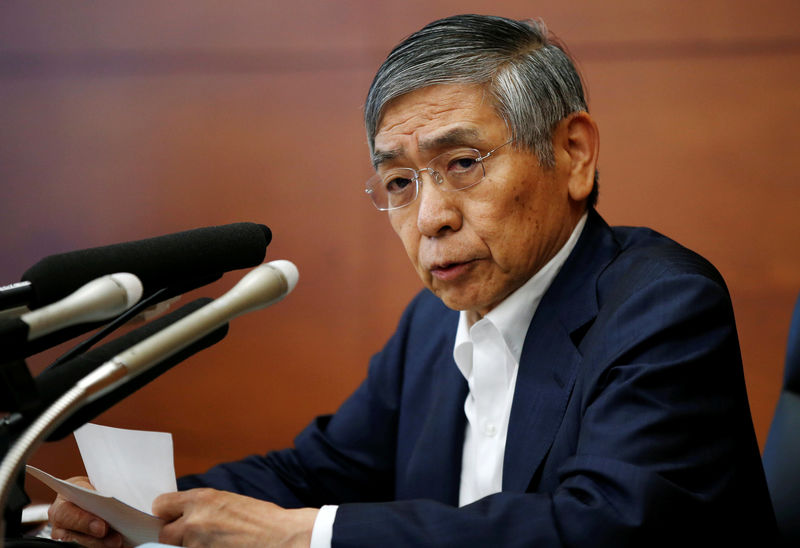By Leika Kihara
OSAKA (Reuters) - Bank of Japan Governor Haruhiko Kuroda said on Monday there were limits to how much central banks can deepen negative interest rates, highlighting the need to maintain the BOJ's current ultra-loose policy to continue pushing up inflation.
He also warned that North Korea posed a risk to an otherwise brightening global economic outlook, stressing that the central bank was closely monitoring the impact of escalating tensions on the Korean peninsula on markets and Japan's economy.
"Our main scenario is for global growth to accelerate moderately. But we'll continue to closely watch how developments in North Korea could affect markets and Japan's economy," Kuroda said in a meeting with business leaders in Osaka, western Japan.
"The BOJ is ready to take appropriate action as needed," he said without elaborating on specific measures.
As with other central banks, the BOJ's first line of defense against major economic and market shocks would be to offer unlimited amounts of liquidity via market operations.
Under a policy framework adopted last year, the BOJ guides short-term interest rates at minus 0.1 percent and 10-year government bond yields around zero percent.
Asked how much room central banks have left in deepening negative rates, Kuroda said none of the central banks that adopt negative rates sets their policy rate deeply in minus territory.
"It's true Europe and Japan have shown there is room to push interest rates into negative territory. But there's absolutely no room to push policy rates into minus territory of, say, 4 or 5 percent," he told reporters after the meeting with business leaders.
Kuroda repeated that it was "premature" to unwind the BOJ's stimulus program or debate an exit from its ultra-easy policy.
Japan's economy expanded at an annualized rate of 2.5 percent in April-June, marking the longest streak of expansion in 11 years, on robust exports and a pick-up in consumption.
But inflation has hovered around 0.5 percent, well below the BOJ's 2 percent target, as companies remain wary of raising prices for fear of scaring away cost-sensitive households.
Kuroda said it was "unrealistic" to bring up Japan's inflation target to around 3 or 4 percent, an idea floated by some U.S. academics as a way to heighten inflation expectations.
But he countered criticism that the BOJ's 2 percent target was too ambitious and called for maintaining the level, deemed a global standard, as its price goal to keep the yen's moves stable against other currencies.
"Foreign exchange rates fluctuate due to various factors in the short run. But their moves reflect inflation differentials between countries in the long run," Kuroda said.
Kuroda praised Japanese companies for making various efforts, such as streamlining operations through automation, to cope with a tightening job market that was pushing up labor costs.
But he said there were limits to how much businesses can absorb rising labor costs without increasing wages and prices.
"There appears to be some signs of change in companies' price-setting behavior," he said.

While such changes are not broad-based yet, it could spread across Japan if the economy continues to expand and make households more accepting of price hikes, he said.